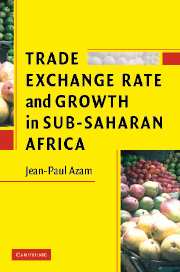Book contents
- Frontmatter
- Contents
- List of figures and tables
- Preface
- List of acronyms and abbreviations
- 1 Introduction and overview
- Part I Unrecorded trade in goods and currencies
- Part II Foreign exchange constraints
- 4 Dollars for sale: inflation and the black market premium
- 5 The public debt constraint in the CFA Zone
- 6 Currency crises, food, and the “Cola nut” effect
- Part III Longer-term growth in African countries
- General conclusion
- References
- Index
4 - Dollars for sale: inflation and the black market premium
Published online by Cambridge University Press: 26 May 2010
- Frontmatter
- Contents
- List of figures and tables
- Preface
- List of acronyms and abbreviations
- 1 Introduction and overview
- Part I Unrecorded trade in goods and currencies
- Part II Foreign exchange constraints
- 4 Dollars for sale: inflation and the black market premium
- 5 The public debt constraint in the CFA Zone
- 6 Currency crises, food, and the “Cola nut” effect
- Part III Longer-term growth in African countries
- General conclusion
- References
- Index
Summary
Introduction
The government of Nigeria used to sell its dollars in the official market at a sizable discount, compared to the parallel market exchange rate, to a small number of selected intermediaries (Odubogun, 1995, Garba, 1997). For example, in 1988, US$ 2,910 million were sold by the central bank, out of a total of US$ 5,229.2 million of exports (including US$ 4,924.9 of oil exports), while the parallel market premium was on average 33.7% (Odubogun, 1995). About US$ 1 billion was thus given up that year. The share of the foreign exchange transactions taking place in this way decreased substantially after February 1995; I focus on the previous period, which provides a natural experiment for assessing the impact of a policy that is common to many African countries. The premium on foreign currencies transacted in the parallel market is often interpreted as a means for taxing private exporters, with a view to implicitly subsidizing government imports (Pinto, 1989). In the case of Nigeria, as well as in the case of many other African countries, this diagnosis needs to be revised, as the government is selling at below market price the dollars that it gets from oil exports and aid money. Aid money is currently negligible in Nigeria. Oil accounts for 98% of the export revenues of the country, and the government has retained the ownership of at least 60% of the capital of the foreign oil companies operating there.
- Type
- Chapter
- Information
- Trade, Exchange Rate, and Growth in Sub-Saharan Africa , pp. 69 - 104Publisher: Cambridge University PressPrint publication year: 2006



